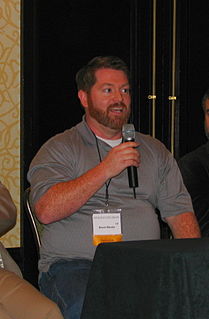A Quote by Brent Weeks
My question is, do you believe in an evil possessed of its own purity? or does every act intend some good?
Related Quotes
When one has once accepted and absorbed Evil, it no longer demands the unfitness of the means. The ulterior motives with which youabsorb and assimilate Evil are not your own but those of Evil.... Evil is whatever distracts. Evil knows of the Good, but Good does not know of Evil. Knowledge of oneself is something only Evil has. One means that Evil has is the dialogue.... One cannot pay Evil in installments--and one always keeps on trying to.
The question of good and evil will always be one of philosophy's most intriguing problems, up there with the problem of existence itself...If evil means to be self motivated, to be the center of one's own universe, to live on one's own terms, then every artist, every thinker, every original mind, is evil. Because we dare to look through our own eyes rather than mouth cliches lent us from the so-called Fathers. To dare to see is to steal fire from the Gods. This is mankind's destiny, the engine with fuels us as a race.
I have heard and seen many examples of the cruelty that we are able to visit on one another during my time. . . I have also seen incredible forgiveness and compassion. Yes, each of us has the capacity for great evil. But for every act of evil there are a dozen acts of goodness in our world that go unnoticed. It is only because we believe that people should be good that we despair when they are not. Indeed, if people condoned the evil, we would be justified in losing hope. But most of the world does not. We know that we are meant for better.
I do not believe that a world without evil, preferable in order to ours, is possible; otherwise it would have been preferred. It is necessary to believe that the mixture of evil has produced the greatest possible good: otherwise the evil would not have been permitted. The combination of all the tendencies to the good has produced the best; but as there are goods that are incompatible together, this combination and this result can introduce the destruction of some good, and as a result some evil.
The question of why evil exists is not a theological question, for it assumes that it is possible to go behind the existence forced upon us as sinners. If we could answer it then we would not be sinners. We could make something else responsible...The theological question does not arise about the origin of evil but about the real overcoming of evil on the Cross; it ask for the forgiveness of guilt, for the reconciliation of the fallen world
Evil denotes the lack of good. Not every absence of good is an evil, for absence may be taken either in a purely negative or in aprivative sense. Mere negation does not display the character of evil, otherwise nonexistents would be evil and moreover, a thing would be evil for not possessing the goodness of something else, which would mean that man is bad for not having the strength of a lion or the speed of a wild goat. But what is evil is privation; in this sense blindness means the privation of sight.
Good and evil are essential differences of the act of the will. For good and evil pertain essentially to the will; just as truth and falsehood pertain to the reason, the act of which is distinguished essentially by the difference of truth and falsehood (according as we say that an opinion is true or false.) Consequently, good and evil volition are acts differing in species.
Perfection... is clearly not achieved simply by being naked, by the lack of wealth or by the rejection of honors, unless there is also that love whose ingredients the apostle described (cf. I Cor. 13) and which is to be found solely in purity of heart. Not to be jealous, not to be puffed up, not to act heedlessly, not to seek what does not belong to one, not to rejoice over some injustice, not to plan evil - what is this and its like if not the continuous offering to God of the heart that is perfect and truly pure, a heart kept free of all disturbance?


































